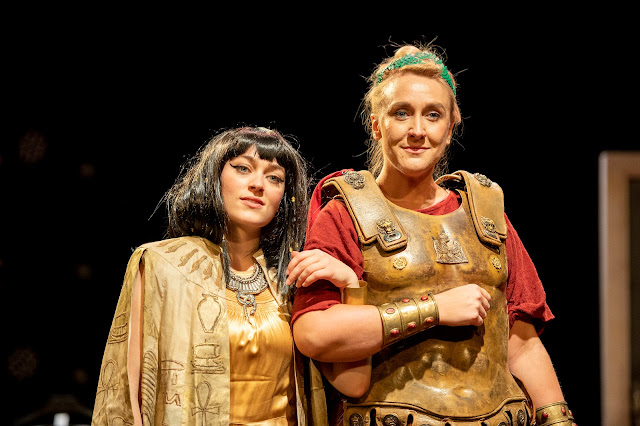 |
| Hasse: Antonio e Cleopatra - Ellie Neate, Thalie Knights - Buxton International Festival (Photo David John King Photography) |
Johann Hasse: Antonio e Cleopatra: Ellie Neate, Thalie Knights, director: Evangeline Cullingworth, musical director: Satoko Doi Luck, Buxton Festival Baroque Orchestra; Buxton International Festival at the Pavilion Arts Centre
Reviewed 16 July 2022 (★★★★)
A rare outing for Hasse's early serenata in a stylish performance that brings the work right up to date
Like Handel before him, Johann Hasse (some 14 years Handel's junior) left his native Germany to get some Italianate polish. His first major work was the serenata Antonio e Cleopatra, which premiered at the estate of a Royal councillor near Naples in 1725. A serenata requiring just two singers with strings and harpsichord, it was a small-scale piece for an aristocratic entertainment much like Handel's cantata Aci, Galatea e Polifemo, written for an aristocratic wedding in Naples in 1708. It was an imaginative idea for Buxton International Festival to stage Hasse's serenata with two singers from this year's chorus.
We caught Buxton International Festival's production of Hasse's Antonio e Cleopatra on Saturday 16 July 2022 at the Pavilion Arts Centre. Directed by Evangeline Cullingworth with designs by Grace Venning, the opera featured Ellie Neate as Cleopatra and Thalie Knights as Antonio. Satoko Doi Luck directed the Buxton Festival Baroque Orchestra from the harpsichord (Michael Gurevich & Emily Nebel, violins, John Crockatt, viola, Tim Smedley, cello, Dawn Potts, double bass).
 |
| Hasse: Antonio e Cleopatra - Ellie Neate, Thalie Knights - Buxton International Festival (Photo David John King Photography) |
The work takes the traditional form of a sequence of da capo arias ending in a duet. Unusually for opera seria, it eschews the exit aria convention, what we have is an operatic dialogue as Antonio and Cleopatra, after their defeat at the battle of Actium, rehash the past and decide their futures. The piece might have been small of scale, but it was written for two of the stars of the day, contralto Vittoria Tesi (who sang Antonio) and castrato Farinelli (who sang Cleopatra). Quite why the cross-dressing, we don't know nor do we know whether the original was staged.
At the Pavilion Arts Centre, Satoko Doi Luck and her ensemble were stage-right, and the rest of the stage was set to suggest a modern hotel room. Ellie Neate's Cleopatra and Thalie Knights' Antonio appeared in modern dress, lovers and fantasists fleeing some unspecified catastrophe. Their luggage formed something of a dressing-up box, as the two played out their fantasies ultimately dressing as Anthony and Cleopatra and rushing out the fire escape, Thelma and Louise style.
Nothing really happens in the opera, it is all about the style of the singing and the rapport between the two principals. As Cleopatra, Ellie Neate had a light, lyric coloratura (her roles include the Fairy Godmother in Massenet's Cendrillon). Her placing of the passage-work was pin-sharp and she brilliantly captured Cleopatra's changeability, her contrariness, fascination and ultimately her determination. By contrast, Thalie Knights sang Antonio with warm mellow tones capturing the character's essential melancholy and suggesting vacillation. There was little attempt to make Knights look overtly masculine, but she successfully conveyed this persona.
Both singers performed the arias with great style. The mature Hasse had the knack of writing elaborate arias that singers enjoyed singing and that showed off their voices. That was also true here. But it is difficult to make dynamic drama out of a sequence of ten-minute da-capo arias. What Neate and Knights did was create a believable and engaging sense of a dynamic partnership, so we were rooting for them when they transformed and disappeared into the night.
Important in the presentation was the flexibility and responsiveness of the instrumental ensemble. Small, yet full of dynamism and character, they created a fluid ensemble with the singers.
It was an imaginative festival idea to showcase two of their young singers in this rare Baroque gem. There are plenty more short Baroque works that would benefit from the same treatment and I do hope the festival continues this theme.
Never miss out on future posts by following us
The blog is free, but I'd be delighted if you were to show your appreciation by buying me a coffee.
Elsewhere on this blog
- Not a kilt in sight: Jacopo Spirei's fascinating production of Rossini's La donna de lago at Buxton - opera review
- Rediscovered rarities, new opera and young artists: I chat to Rosetta Cucchi, artistic director of Wexford Festival Opera - interview
- Farewell Comrade: Music written in the shadow of death, Theresienstadt 1941-1945 at Temple Music - concert review
- Interior life: Malcolm Martineau and friends in the complete songs of Henri Duparc - record review
- Telling tales of love: Ailish Tynan and James Baillieu at Wigmore Hall - concert review
- Dutch director Annemiek van Elst brings a very different ethos to the comedy of Britten's Albert Herring for St Paul's Opera - opera review
- Style and substance: a fascinating & engaging account of The Yeomen of the Guard at the Grange - opera review
- Growing up with Hildegard: Voice trio on the importance of Hildegard of Bingen's music to them alongside contemporary pieces - interview
- Gareth Wilson & choir of Girton College, Cambridge return to the richly textured music of Marc'Antonio Ingegneri for a second disc on Toccata Classics - record review
- Beyond the Garden: Developing an Opera, composer Stephen McNeff explores how he and librettist Aoife Mannix developed their new opera - feature article
- Evoking the Ancien Régime: grandeur & imagination in Jean-Joseph de Mondonville's Grands Motets - record review
- Added depth: Julien Van Mellaerts & James Baillieu mix Die schöne Müllerin with the poems not set by Schubert, read by Christopher Purves, to remarkable effect - record review
- Home











No comments:
Post a Comment